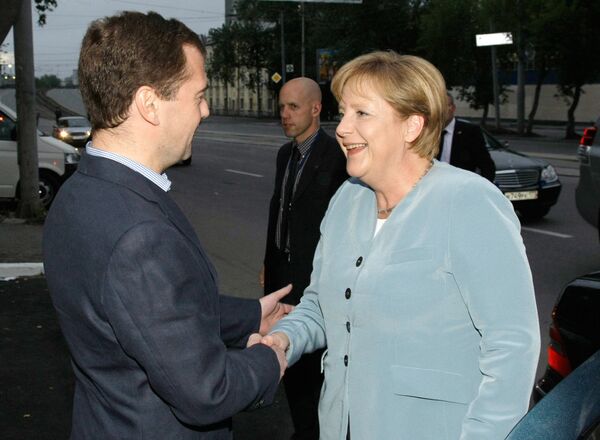German Chancellor Angela Merkel arrived in the city of Yekaterinburg Wednesday for a meeting with President Dmitry Medvedev. Russian-German consultations are a frequent occurrence, but few are as important for both countries as this meeting.
On July 14 and 15, the two sides will essentially be holding a joint cabinet meeting attended by nearly 100 leaders of their largest respective industrial, banking, trade and commodities companies.
Also, this is a rare case where Merkel's political problems back home are pushing her toward greater economic cooperation with Russia in the export, import, commodity and energy sectors, as well as in investment, innovation and modernization.
Germany and Russia have overlapping interests in the latter three spheres, which could turn the meeting in Yekaterinburg into consultations on mutual economic assistance. The sides will discuss how they can best help each other, both economically and politically.
Merkel is especially interested in scoring political points. Germans are displeased with the severe budget cuts made in response to the crisis in the euro zone, which have taken a serious toll on their incomes and social benefits. They've even stopped calling Merkel "Mutti," or "Mom."
According to recent polls, support for Merkel's CDU/CSU faction has fallen to a record low 35%. At the same time, support for the Social Democrats and the Green party has risen to 45%.
Growing disenchantment with Merkel in the CDU/CSU was not abated by Germany's third-place finish at this year's World Cup. Merkel's government had hoped the victory would overshadow its fiscal sins, but not this time. It will have to do better than that to turn this tide.
Merkel begins her "big eastern tour" in Yekaterinburg - which Europe sees as the gateway to Siberia - in a bid to pave the way for German exports to Russia and Asia, to secure additional contracts for German companies, and to ensure Germany access to reasonably priced energy. She will then travel to China and Kazakhstan in pursuit of these same goals.
Before departing for Russia, Merkel's team indicated that the chancellor sees the trip as a welcome break from her political problems at home as well as an opportunity to integrate Germany into the economic modernization programs under way in Russia, China and Kazakhstan.
According to German sources, it was German captains of industry that persuaded Merkel to help Russia modernize its economy and infrastructure so that it will be up to German standards for industrial equipment and product quality. This will allow Russia to purchase more German goods, further stimulating Russia's economic development.
In other words, Germany wants Russia to improve to the point that it needs more highly efficient German equipment. This is self-serving to an extent, but business is business.
The German delegation includes the heads of the carmaker Volkswagen, the industrial conglomerate Siemens, the aircraft concern Airbus, the chemical giant BASF, the retail concern Metro, and Germany's main export-import bank Commerzbank.
The sides expect to sign more than a dozen documents in Yekaterinburg, including agreements on Siemens's involvement in the ambitious Skolkovo high-tech project and on training Russian managers at German universities.
However, the focus of the meeting will be railroad projects. Russia and Germany have been working together in this sphere for decades, and now Russian Railways and Siemens are expected to strike a deal that will provide Russia with 240 modern trains worth 2.2 billion euros.
The Sapsan high-speed trains running between Moscow and St. Petersburg were also supplied by Siemens, and in 2011 Russia will receive Desiro commuter trains, which will be called Lastochka (Swallow) in Russia. They will run to airports in Moscow and other large cities and will be the primary mode of transportation at the 2014 Winter Olympics in Sochi.
Siemens and Synara will supply 220 electric freight locomotives made at the plant in Verkhnyaya Pyshma near Yekaterinburg.
Germany expects Russia to reciprocate by accelerating construction of the Nord Stream gas pipeline along the Baltic Sea bed. Merkel has reportedly had a separate conversation with Medvedev on this issue.
Germany depends heavily on energy and other commodities from Russia. In the first six months of 2010, Germany imported 13% more Russian commodities compared to the same period of 2009, while Russia had to cut its imports from Germany by 7%. Berlin hopes that economic modernization and innovation projects will boost German exports of technology and other goods to Russia. This, in turn, will help Russia to shift its economy toward greater industrial production, consumer demand and, ultimately, more German imports.
Russian-German trade and economic cooperation is quite good. According to German statistics, German exports to Russia grew 200% from 2000 to 2009, but fell 40% ($39.9 billion) last year due to the global recession. However, bilateral trade soared by 50% to $15.2 billion from January through April 2010.
The political agenda is much more modest compared to the economic one, indicating that Russia and Germany maintain similar positions on key geopolitical and regional issues.
Germany supports Russia's proposal for visa-free travel to the EU, but the decision does not hinge on Germany alone. There is reason to assume that residents of the Kaliningrad Region, Russia's exclave on the Baltic Sea Coast, will be the first Russian citizens to travel to Europe without a visa, as both Germany and Poland support this move.
During their meeting in Yekaterinburg, Merkel and Medvedev will attend the St. Petersburg Forum of Russian and German artists, scientists and politicians, first held in St. Petersburg in 2000. They will also meet with participants of the German-Russian business forum.
RIA Novosti political commentator Andrei Fedyashin
The opinions expressed in this article are the author's and do not necessarily represent those of RIA Novosti.

